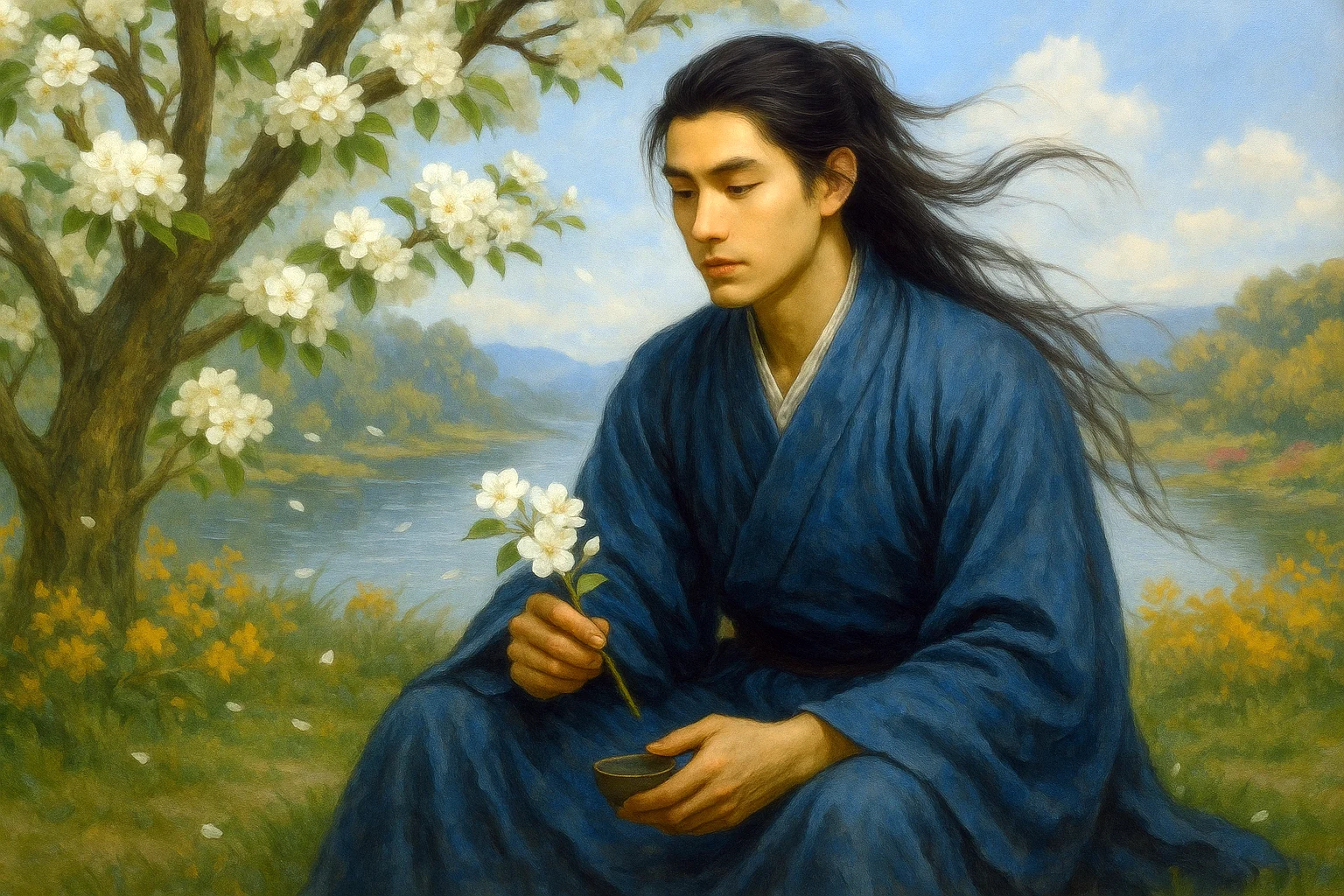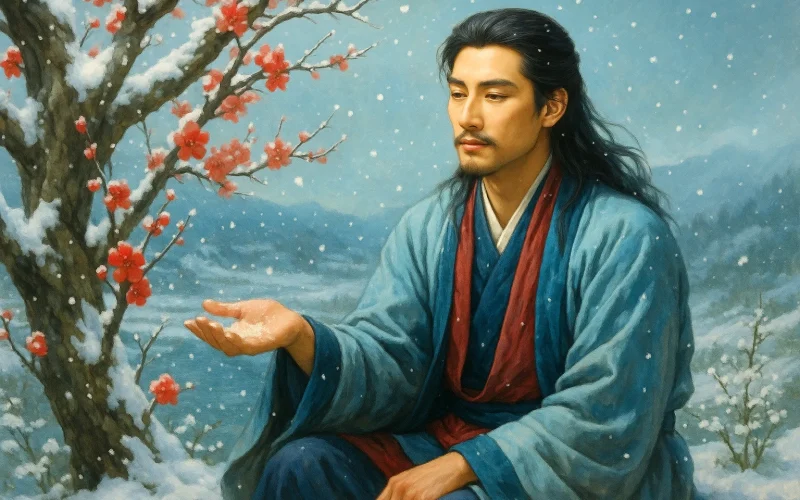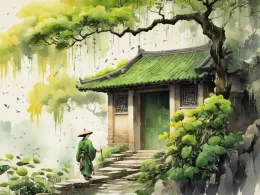Shearing his locks, he sought the Way—
No place on earth his home need be.
Pine winds unroll his dharma seat,
River-moon bathes his cassock free.
At dawn, cicadas chant from soaring eaves,
Few travelers tread the sky-wide lanes.
Dai Yong's brush moves—lost in thought,
He writes, forgetting flesh remains.
Original Poem
「送少微上人入蜀」
李端
削发本求道,何方不是归。
松风开法席,江月濯禅衣。
飞阁蝉鸣早,漫天客过稀。
戴颙常执笔,不觉此身非。
Interpretation
This farewell poem honors a Buddhist monk named Shaowei departing for spiritual practice in Shu (modern Sichuan). A common Tang literary theme, such works celebrated monastic wanderings while contemplating life's deeper truths. Through pristine natural imagery mirroring the monk's transcendence, Li Duan explores the nature of enlightenment and spiritual homecoming.
First Couplet: "削发本求道,何方不是归。"
Xuēfà běn qiú dào, héfāng bùshì guī.
Shorn locks mark your path—
Where is not home for the Way?
The opening couplet distills Buddhist wisdom: the monk's tonsure (削发) symbolizes liberation from worldly ties, while the rhetorical question reframes all directions as equally sacred. The poet's admiration shines through this paradox—true belonging exists precisely in rootlessness.
Second Couplet: "松风开法席,江月濯禅衣。"
Sōng fēng kāi fǎ xí, jiāng yuè zhuó chán yī.
Pine winds unfurl your dharma seat;
River moonlight launders zen robes.
Nature becomes an extension of practice here. The personified winds "unfurl" (开) an impromptu teaching space, while the moon's reflection "cleanses" (濯) not fabric but the soul itself. This alchemy transforms landscape into liturgy.
Third Couplet: "飞阁蝉鸣早,漫天客过稀。"
Fēi gé chán míng zǎo, màntiān kè guò xī.
Dawn cicadas chant from lofty eaves;
The sky-road wears few pilgrims' footprints.
The imagery turns elegiac—the insects' urgent song contrasts with the empty "sky-road" (漫天), a metaphor for both the monk's solitary path and life's fleeting traffic. The sparse "footprints" (客过稀) amplify the loneliness of spiritual pursuit.
Fourth Couplet: "戴颙常执笔,不觉此身非。"
Dài Yóng cháng zhí bǐ, bùjué cǐ shēn fēi.
Like Dai Yong wielding his brush—
Your grace makes us forget these dust-bound forms.
The closing allusion to Dai Yong (a Jin dynasty monk-artist) elevates Shaowei to living art. The phrase "forget these dust-bound forms" (此身非) resonates doubly: it praises the monk's ability to transport others beyond materialism, while hinting at the poet's own awakened detachment.
Holistic Appreciation
The poem exudes serene elegance, devoid of overt parting sorrow yet permeated with reverence and quiet longing. The opening couplet begins philosophically, conveying the universality of spiritual practice; the middle couplets use secluded scenery to frame the monk’s journey, reflecting both his path of cultivation and the tranquil beauty of his return. The closing lines allude to classical lore, deepening the portrayal of the monk’s character and the poet’s admiration. Free from worldly distractions, the poem reveals a noble monk’s resolve harmonizing with nature’s Zen-like purity—a farewell that transcends the physical, ascending to spiritual awakening.
Artistic Merits
- Scenery as spiritual metaphor: Mountains, river-moon, and pine-winds become Zen-infused realms, mirroring the practitioner’s mind through nature’s language.
- Subtle diction, profound resonance: Though avoiding the word “farewell,” every line quietly honors departure—restrained yet deeply respectful.
- Masterful allusion: The closing reference to Dai Yong’s brushwork (戴颙执笔) showcases the poet’s erudition while elevating the poem’s philosophical depth.
- Harmonious rhythm: The regulated verse structure, precise diction, and meditative cadence mirror the poem’s Zen essence.
Insights
This poem reminds us: true belonging lies not in distant landscapes, but in the heart’s compass. The monk’s journey to Shu symbolizes both physical travel and spiritual homecoming. Through this farewell, the poet contemplates life’s essence and the realm of practice. Beyond worldly clamor, perhaps the clarity of pine-winds and river-moonlight is the inner sanctuary we all seek.
About the Poet

Li Duan (李端, c. 743–785), a native of Zhaoxian in Hebei Province, was among the "Ten Literary Talents of the Dali Era" during the Mid-Tang period. He excelled particularly in five-character regulated verse, crafting poetry of refined elegance and subtle nuance. His works frequently explored themes of reclusive living and the melancholy of separation, with over 250 poems preserved in the Complete Tang Poetry anthology.











